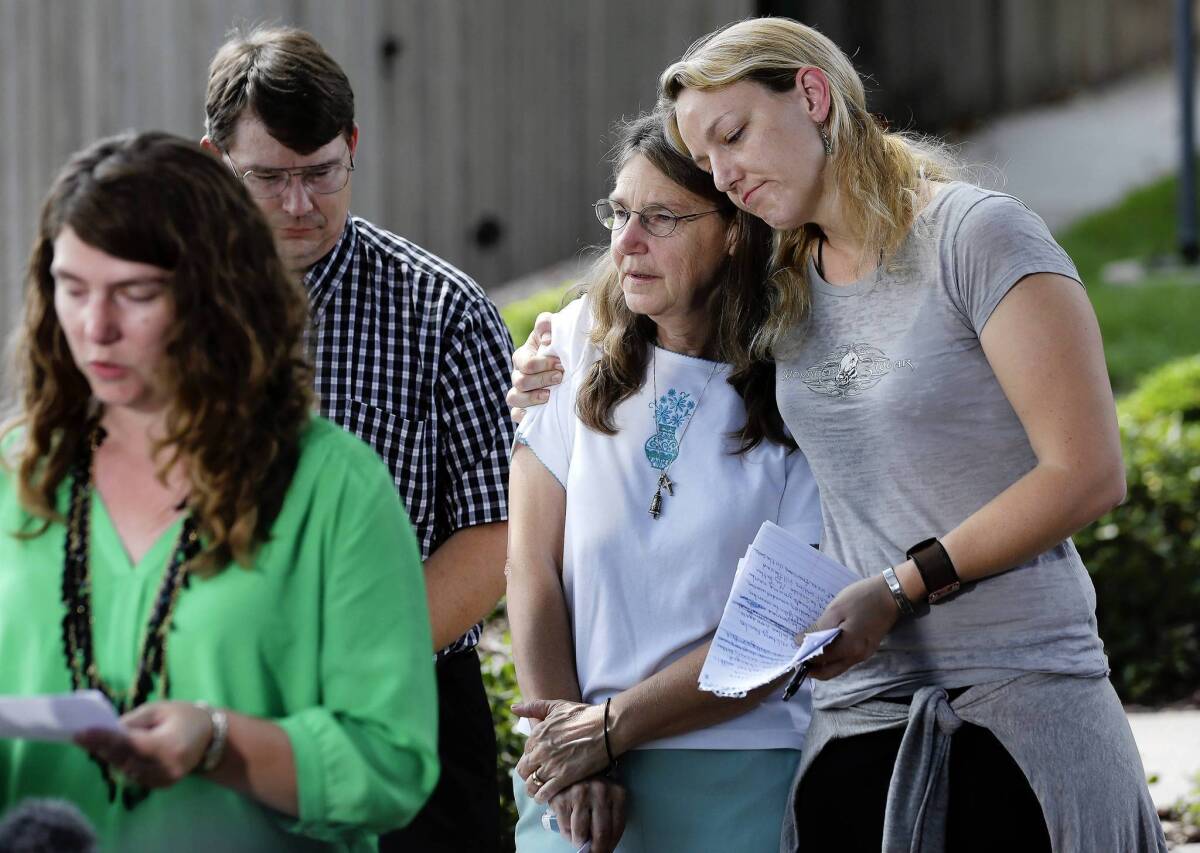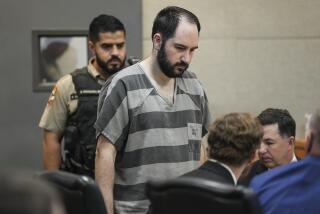Maj. Nidal Malik Hasan gets death sentence in Ft. Hood shootings

- Share via
FT. HOOD, Texas — A military jury handed down a rare death sentence Wednesday to Maj. Nidal Malik Hasan, convicted of murder last week for the mass shooting at this central Texas Army post that killed 13 people and wounded more than 30 others.
The jury president, the highest-ranking colonel on the panel, announced the sentence in the afternoon as more than half a dozen victims’ relatives looked on from the gallery.
Hasan, who refused to shave his beard for religious reasons, stared at the colonel as she explained that for the multiple murders, he should be forced to forfeit all pay, dismissed from the military and “put to death.”
Once she finished, Hasan shifted his gaze — staring straight ahead, blinking, betraying no emotion.
Several of the jurors stared at Hasan. One sighed.
Hasan, 42, an Army psychiatrist, was convicted last week of 13 counts of premeditated murder and lesser charges in connection with the attack on Nov. 5, 2009. The same jury of 13 officers, all Hasan’s rank or higher, deliberated for less than two hours before sentencing him to die. The jury’s vote was unanimous.
Hasan, who was shot and paralyzed in the attack and remains in a wheelchair, was wheeled out of court and taken to a local jail to await a military flight to Ft. Leavenworth, Kan., where he will become the sixth inmate on military death row, a Pentagon spokesman said.
After the sentencing, victims’ relatives consoled one another. The mother of a soldier killed in the attack, 29-year-old Staff Sgt. Amy Krueger, wiped away tears. Some spoke of their relief.
“This has been a very long and exhausting process. We are tired. We are hurt. We are resolved: Justice has been served,” said Keely Vanacker, daughter of Michael Cahill, 62, the lone civilian killed in the shooting.
One victim’s mother questioned Hasan’s professed motive: protecting the Taliban as a Muslim guerrilla fighter.
“Anyone who would use their religion to commit acts of terrorism serves no God except their own hatred and self-interest,” said Gale Hunt during a briefing at the Army post, adding that, “as a Christian, I cannot say I wish anyone dead for crimes against me or my family, but that doesn’t mean that I’m opposed to the death penalty.”
Retired Army Staff Sgt. Alonzo Lunsford, 46, was shot seven times in the attack, and is among those who have sued the federal government to have the shooting classified as terrorism with the requisite benefits for victims. He had been hoping for a death sentence.
“Now I want it to actually happen,” Lunsford said.
The death sentence must be approved by the Ft. Hood commanding general who convened the court-martial. If approved, it will automatically be appealed in military court and potentially to the U.S. Supreme Court, according to Geoffrey Corn, a former military prosecutor who is now a professor at South Texas College of Law in Houston.
Hasan has been paid about $7,300 a month leading up to sentencing and acted as his own attorney, but both the pay and the self-representation end with the court-martial, Corn said.
Military lawyers will handle the appeals, which Corn predicted Hasan would support.
“He wants to keep the legal arguments alive,” Corn said. “I just don’t think he’s going to give up.”
Hasan could appeal on the grounds that under military law, he was not allowed to plead guilty to a capital crime, Corn said. But he said a more significant appellate issue was whether Hasan and others charged with capital crimes had a right to act as their own attorneys.
Hasan’s military legal advisors protested during the trial that he was seeking the death penalty, preventing them from presenting a defense, witnesses and evidence in his favor.
His civil attorney, John Galligan, said he expected lengthy appeals based on ineffective assistance of Hasan’s military legal advisors, who he said left the case “in disarray.”
“This was not a fair trial. I’ve lost a lot of respect for the system,” said Galligan, a former military judge.
Once Hasan exhausts his appeals, his death warrant would have to be signed by the president. No military death row inmate has been sent to the death chamber since 1961. But Corn said Hasan was an exceptional case.
“This may be the one that gets there,” he said, although it would probably take years.
Hasan’s long-delayed court-martial proved shorter than expected, with less than a month of testimony. Hasan effectively boycotted the proceedings. He refused to testify or call witnesses, rarely cross-examined the more than 100 prosecution witnesses and presented scant evidence compared to more than 700 exhibits submitted by the prosecution. At sentencing, Hasan declined to make a statement or closing argument.
Years ago, Hasan told a military mental health panel that being executed would make him a martyr. But a military prosecutor insisted in closing arguments Wednesday that a death sentence is not martyrdom.
“He is not now and will never be a martyr,” said the prosecutor, Col. Michael Mulligan. “Do not be fooled. He is not giving his life — we are taking his life. This is not his gift to God. He is a criminal, a cold-blooded murderer.”
molly.hennessy-fiske@latimes.com
More to Read
Sign up for Essential California
The most important California stories and recommendations in your inbox every morning.
You may occasionally receive promotional content from the Los Angeles Times.











